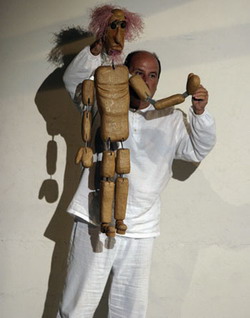Cuban puppeteer awarded in Spain
- Submitted by: admin
- Arts and Culture
- Entertainment
- Europe
- International
- Theater
- 09 / 29 / 2007

The 2007Gongorito Prize is now in Cuba, after dramatist Freddy Artiles brought it home from San Martín de Valdeiglesias, Spain, as one of his most cherished possessions.
The prize consists of a clay puppet that resembles a child, very similar to the popular Cuban puppet «Pelusín,» said the specialist in puppets and childrens theatre on his arrival.
The Spains International Marionettes Union (UNIMA), with support from the community of Madrid and the UNIMA Spanish Federation, and an international jury formed by prominent and renowned figures of the puppets theatre, chose the Cuban teacher and theatre researcher from among the five candidates that were presented this year.
Coinciding with the celebration of the Sixth Summer School for Puppeteers in the Spanish capital, Artiles received the statuette on August 30. It was presented by the hands of Ms. Pepita Quintero, widow of Maese Villarejo, who was the creator of Gorgorito, the puppet after which the award is named. The Gorgorito Prize has been awarded since 2003.
"Surprised?
"Of course, very surprised! The rest of the candidates were really important figures in Latin American puppet theatre.
"¿What does this prize represent for Artiles and for the Cuban theatre of puppets?
"This award represents recognition of the personal work of an entire lifetime, and for the Cuban artists of puppet theatre - who I know are very happy with this award because they feel as if it is their own. It shows that six years of work in this theatre specialty were not in vein and that they have had an international impact.
"Do you think that the theatre of puppets is threatened by high-tech and the media in this technological world in which we live?
"Of course it is! Thats why the presence of live puppets before children is so important, the communication between the child and the puppet in real time. Somehow, this disinfects children of an excessive media contamination. It makes them closer to play, which is the main element for the development of any child.
"When children go to the theatre, they enjoy in a different way; they are not «hypnotized,» and react normally. We could say that it is a way of fostering their spiritual growth. Cuban children are not so «contaminated.» Do you think todays Cuban puppet theatre contributes to this goal?
"Sure! Especially since the 1990s - when a period of economic hardships began in Cuba. Cuban puppet theatre has reached the highest level in its history. Undoubtedly, this has been a gift for our children "who, at my age and in this terrible world between two centuries" are my greatest refuge.
"Then, do you think that Cuban puppet theatre is at the worldwide level of the puppet theatre?
"Sure, I think so, and this is shown by the strong showing and presence of Cuban puppeteer groups in important festivals around the world. However, Im sorry that it is not as valued as other arts in our country.
Source: By Mayra Viñalet Navarro, Juventud Rebelde
Comments